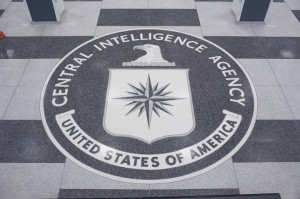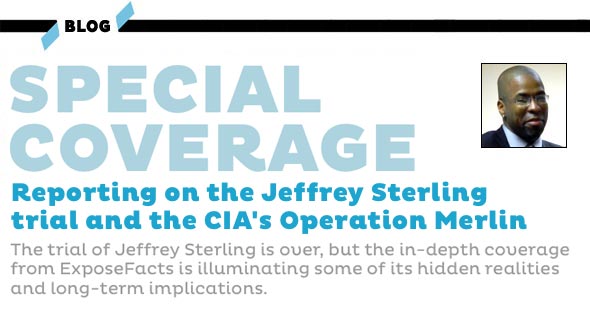 After opening arguments on the first day of the Jeffrey Sterling trial, the government called three former and current CIA officers to testify behind a screen and under partial names, “Stephen B,” “Laurie D,” and “Zach W.” The three served, in turn, as the first three case officers for the Russian involved in Operation Merlin described in James Risen’s book, State of War. Sterling would become the fourth CIA officer working with the Russian in late 1998.
After opening arguments on the first day of the Jeffrey Sterling trial, the government called three former and current CIA officers to testify behind a screen and under partial names, “Stephen B,” “Laurie D,” and “Zach W.” The three served, in turn, as the first three case officers for the Russian involved in Operation Merlin described in James Risen’s book, State of War. Sterling would become the fourth CIA officer working with the Russian in late 1998.
The first two officers, Stephen B and Laurie D, who came off as no-nonsense professionals, largely served to lay the background for the operation. Stephen B described how he persuaded the Russian — referred to as “Merlin” at the trial — to work for the CIA after he immigrated to the US in the mid-1990s by showing him a suitcase full of cash. Stephen B confirmed that CIA had paid the Russian around $300,000 over two years to tell what he knew of the Russian nuclear program. In that debriefing role, the Russian proved a gold mine for the CIA: “the most important [source] that I ever worked on,” Laurie D testified. After several years of cooperating with the Agency in that role, in 1997 the CIA considered, and the Russian agreed, to move into a more operational role, to deceive the Iranians that he wanted to sell nuclear materials for money. The Russian’s motivation to cooperate in that role, the defense had Laurie D read from a CIA cable she had written in early 1997, “was almost purely financial.”
Stephen B and Laurie D also laid the background for CIA’s security efforts with the Russian. While neither admitted that the Russians would surely assume a nuclear engineer who moved to the US would be approached by the CIA, they emphasized why they’d like to keep secret that he had decided to do so. They described meeting in hotels, rather than at the CIA, claiming this was also for his safety (only once did Laurie D admit it was also for the CIA’s own security). And they described how information pertaining to the Russian was compartmented, making it unavailable — to the case officers at least — before they worked the case, and unavailable outside of casual conversation after they had moved onto other assignments. In a key detail, Laurie D testified that CIA would have withheld details about the flaws in the blueprints dealt to the Iranians “for his own security,” so he’d have “plausible deniability.”
Zach W — the third CIA officer, who played a key role in setting up Operation Merlin before he handed the Russian off to Sterling — came off less impressively. Because the public had no visual cues because he (like the other two officers) testified behind a screen, his voice and overly-helpful answers recalled Vizzini, the Princess Bride character who dies in a battle of wits. The government used Zach W to explain how Operation Merlin came about, to get him to deny having spoken with James Risen, and to disclaim any concerns about the operation, But on cross-examination, he hurt the government’s case in three ways:
- He presented contradictory evidence about the Russian’s knowledge of the blueprints dealt to Iran
- His demeanor started crumbling when the defense pointed out where he’d fit in Risen’s book
- The defense demonstrated that in both functional position and language, Zach W was a closer fit to the focalization and language used in Risen’s book than Sterling is
Contradictory evidence about the Russian’s knowledge of the blueprints
As the prosecution explains it, James Risen’s book is wrong in that it portrays the CIA dealing nuclear blueprints to the Iranians that had obvious flaws. The government claims the letter largely reproduced in Risen’s book does not, as he claimed, describe the Russian warning Iran of those obvious flaws, but instead withholding information until they paid him for more. The government claims that Sterling — and only Sterling — made up the story about the flaws to make the story more interesting to Risen and the Senate Intelligence Committee.
As noted, however, Laurie D testified that CIA left the Russian in the dark about much of this. He was cooperating to write a letter about missing data that he purportedly didn’t know about.
Except the Russian did believe he knew about what was missing from the blueprints. The documents consisted of a diagram and a list of parts. As soon as he saw the list at a meeting in November 1998, according to Zach W, the Russian complained that some more parts needed to be included on the list. “This doesn’t match,” Zach W described the Russian saying immediately after he saw the blueprints, “you should have this on this list. … Merlin was always trying to make the [document] more complete, Zach W testified. To make things worse, the technical guy who attended that meeting, Len, could not provide answers to the Russian right away, leading to a series of cables to try to address his concerns. In other words, whether or not there were other flaws in the blueprints, the Russian clearly believed the blueprints were not adequate, at least in the weeks leading up to the operation. This suggests at least some of the people involved in the operation, including the Russian, did believe precisely what appears in Risen’s book.
Zach W’s demeanor started crumbling
As noted above, Zach W’s demeanor started as very confident and overly helpful. He always answered “yes” or “correct” to questions, and at one point got ahead of the prosecution’s questions, leading the defense to object. As someone who had been in the CIA since the 1980s, he had the air of telling how hard things used to be before Google.
But his confident demeanor started crumbling soon after the cross examination started. The government had ended its questioning by asking if he knew Risen. “I know who he is, I never talked to him,” Zach W answered. When asked again if he had ever talked to him, he answered, no, twice.
Then under cross-examination, the defense got him to repeat his description of how he worked with the Russian to make himself available to Iranians by sending letters. When Zach W was asked if he sent the Russian to conferences, he said he was reluctant to say without material in hand to check. The defense then asked when he read the book. Zach W sighed audibly. They walked through the passage describing a case officer working with the Russian to reach out to the Iranians. In response to a question about that, Zach W answered, for the first time, “mmm hmmm.” “I’m sorry, you have to say yes or no,” Judge Brinkema responded. You are that case officer being referenced, the defense asked. “To some degree it does,” Zach W responded, “it seems more precise in targeting, just saying.”
Then the defense led Zach W through how the blueprints were discussed, either as “blueprints,” “firing set,” or “fire set” in the CIA cables and the book. “Firing set is something you’d use,” the defense asked after getting Zach W to say he didn’t know how the Russian described the part. “That’s what we were talking about,” Zach W responded. The defense pointed to another instance, “fire ring set.” For the second time, Zach W answered, “mmm hmmm.” “You have to say yes or no,” Judge Brinkema reminded again.
After laying out all the cables Zach W had written that use the same language that appears in the book, the defense then turned to the cable Zach W wrote about the meeting in San Francisco. He pointed to the description of Sterling, the Russian, and his wife, going to wine country. This was something the prosecution had said only Sterling knew about. When asked if the cable talked about wine country, Zach W once again answered “mmm hmmm.”
At all the points where the defense pointed Zach W to evidence that he, not Sterling, might have been the source depicted in Risen’s book, he grew far less confident in his answers.
The defense demonstrated Zach W a closer fit than Sterling
Zach W’s demeanor started crumbling, presumably, because he saw what the defense was doing: showing that, contrary to the government’s claim, Zach W was a better fit for both the focalization (whose perspective an event is narrative from) and the actual language used in Risen’s book.
The government tried to limit the damage on redirect, but did so in a way that undermines their case. They asked Zach W whether Sterling would have had access to all the cables using the vocabulary that shows up in Risen’s book. Zach W said Sterling would have been able to read those cables as part of coming up to speed on the background of the operation or when Sterling was at CIA’s Counterproliferation Division before taking over the Russian agent in New York (the detail that Sterling had been there not been revealed before).
In its opening argument and in questioning of other witnesses, the government has emphasized how closely compartmented this information is. But in an effort to counter the suggestion that, because Risen’s book adopts the language used in cables written by Zach W, both the prosecution and Zach W suggested it’s not as compartmented as they first made out.
Either it is compartmented such that other Iran experts in the Counterproliferation Division could not read it, or it’s not. But the government has now submitted testimony suggesting both might be the case.

